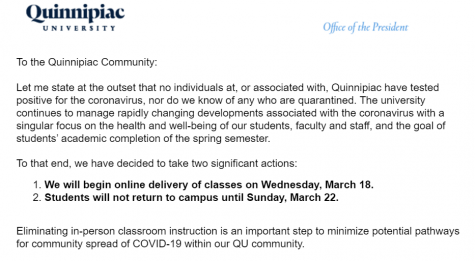Quinnipiac takes big steps during coronavirus fears
March 10, 2020
Quinnipiac will be transitioning to online classes for the rest of the spring semester, as the University attempts to keep students and faculty safe from the coronavirus.
All classes at Quinnipiac will transition to online courses beginning on Wednesday, March 18 for the remainder of the spring semester. Students may return to campus beginning on Sunday, March 22.
See full announcement: https://t.co/fsUMrgH6If pic.twitter.com/n2q0sb4NVC
— Quinnipiac University (@QuinnipiacU) March 10, 2020
An email from President Judy Olian to the Quinnipiac University Parents Council on Tuesday, March 10, said that “we are transitioning all programs to online delivery only for the rest of the semester, and are delaying the return of students by a week,” while furthering that the university will remain open at this time.
The email continued to say that students “can choose to return to campus on Sunday, March 22nd”.
Not long after this circulated and QU Barstool posted about the alleged cancelling of classes, Judy Olian sent an email to the entire student body clarifying the University’s ongoing path for the spring semester. There were no details about how the classes would be presented digitally, but that they would begin Wednesday, March 18.
President Olian said the classes will still be “delivered synchronously, i.e., at the normal class time with the professor” and that “each professor will be in contact with students about their specific classes and provide directions.”
We are transitioning all programs to online delivery only for the rest of the semester, and are delaying the return of students by a week,
— President Judy Olian
Students have the choice to stay at home and take classes remotely, or to return to campus. However, “please do not return to campus if you are feeling unwell, or if you need to self-isolate,” President Olian said, as you “pose a health risk following exposure to an individual or region affected by the coronavirus.”
Faculty has been preparing to possibly transition to online courses since Monday, after a message from interim executive vice president and provost, Jennifer Brown.
“We all recognize that the coronavirus pandemic presents unprecedented challenges,” said Brown, “Each School at Quinnipiac is unique in its courses, modalities, accreditation standards, and resulting requirements to fulfill students’ academic needs for the semester.”
Brown went on to outline numerous technological options including Blackboard, Zoom video conferencing, Techsmith (which allows professors to voice-over power points) and Office 365.
The message continued as Brown asked them to “reach out to [their] Department Chair and/or Dean now with a very brief outline summarizing what it will take for you to deliver your courses and final exams online.”
While the logistics of digital classes and the impact the coronavirus will have on residential and student life are a concern to many, the University’s task force, formed in February, is continuing to monitor the pandemic.

If there are any students who need to remain on or return to campus earlier than March 22, they must reach out to Mark DeVilbiss, Director of Residential Life.
Any upcoming university events have been canceled. Students can expect an email on March 18 at 4 p.m. with updates to the situation.
Colleges across New England including University of New Haven and Sacred Heart University have been taking action in the midst of increased coronavirus cases and shutting down. Some have simply extended spring break, and others have called for the rest of the semester to be delivered online.
We don’t do this lightly. We’ve got to be prepared for what is happening.
— Governor Ned Lamont
The Covid-19 virus has now infected almost 113,000 people worldwide and killed more than 4,000. The majority of these are located in mainland China, but it now is spreading globally.
Governor Ned Lamont is declaring “civil preparedness and public health emergencies” in Connecticut so that the state can allocate funds and take specific response to the virus. The hope is that this will speed up public health regulations and increase the amount of tests being given.
“We don’t do this lightly,” said Governor Lamont, “We’ve got to be prepared for what is happening.”
Only two people who live in Connecticut have tested positive for the coronavirus: a woman in her 60s from Bethlehem who works at Bridgeport Hospital and a Wilton man in his 40s or 50s. Two others with connections to Connecticut have tested positive as well. 54 of the state’s patients have tested negative.






